Imperial Examinations
The Imperial Examinations, or Imperial Examination System, is a civil service examination system administered for the purpose of selecting candidates for the state, or imperial, bureaucracy. These exams serve to ensure a common knowledge of writing, reading, mathematics, the Classics, imperial history, and a common literary style amongst state officials. It is thought that such a common culture helps to unify the empire and forward the ideal of achievement by merit rather than circumstance of birth. Which gives legitimacy to imperial rule. This also serves to temper the power of the Daixue and military authority.
Students are either recommended by their county or prefectural schools or must register for the exams within their home prefecture. The only qualification one needs to take the exams is a basic education.
During the exams, each candidate must travel to the imperial capital of Tenyuanchéng, make their way to the Shiceng, the third tier of the city-mount where the exams are to be held. Upon arrival at the compound, the candidates must have with them a water picther, a chamber pot, bedding, food, an inkstone, ink and brushes. Paper, stamped with an official seal, is provided to the examinees. Guards are set at the entrance to the compound to verify the student's identity and to search them for any sort of hidden texts or paperwork to be used as cheat sheets during the exams. Each student is provided a numbered cell based upon the astrological system and contains a bed, desk, and a bench. The exams consist of mathematical formulae and essay questions on history and the Classics, and can take up to three days to finish. Any interruptions or outside communications are forbidden during the exams.
Answer sheets are processed by the Sealing Offices at the end of the examination. Exact quotes from the Classics are often required, and misquoting even a single character, or writing it incorrectly, will mean failing the entirety of the exam. There are many that are desperate enough to try anything, including writing text on their undergarments and smuggling it into the compound, in order to pass the exams.
In order to prevent things such as favoritism for any one candidate, the Sealing Office erases any information about the candidate, themself, and assigns a number to each answer sheet. Each, individual answer sheet is then copied three times by the Copy Office in order to obscure any examinee's handwriting. The reviews of the exams are then carried out by several people: the examining official, who then hands them over to a secondary examining official, then on to the examiner themselves or one of a number of vice examiners. These officials then checked the results of the first two examiners and deliver the final grade.
There are, of course, systems of exams at every level of government within the empire. From the provincial down to the prefectural, county, and city. The imperial, or national, exams are the most difficult.
Students are either recommended by their county or prefectural schools or must register for the exams within their home prefecture. The only qualification one needs to take the exams is a basic education.
During the exams, each candidate must travel to the imperial capital of Tenyuanchéng, make their way to the Shiceng, the third tier of the city-mount where the exams are to be held. Upon arrival at the compound, the candidates must have with them a water picther, a chamber pot, bedding, food, an inkstone, ink and brushes. Paper, stamped with an official seal, is provided to the examinees. Guards are set at the entrance to the compound to verify the student's identity and to search them for any sort of hidden texts or paperwork to be used as cheat sheets during the exams. Each student is provided a numbered cell based upon the astrological system and contains a bed, desk, and a bench. The exams consist of mathematical formulae and essay questions on history and the Classics, and can take up to three days to finish. Any interruptions or outside communications are forbidden during the exams.
Answer sheets are processed by the Sealing Offices at the end of the examination. Exact quotes from the Classics are often required, and misquoting even a single character, or writing it incorrectly, will mean failing the entirety of the exam. There are many that are desperate enough to try anything, including writing text on their undergarments and smuggling it into the compound, in order to pass the exams.
In order to prevent things such as favoritism for any one candidate, the Sealing Office erases any information about the candidate, themself, and assigns a number to each answer sheet. Each, individual answer sheet is then copied three times by the Copy Office in order to obscure any examinee's handwriting. The reviews of the exams are then carried out by several people: the examining official, who then hands them over to a secondary examining official, then on to the examiner themselves or one of a number of vice examiners. These officials then checked the results of the first two examiners and deliver the final grade.
There are, of course, systems of exams at every level of government within the empire. From the provincial down to the prefectural, county, and city. The imperial, or national, exams are the most difficult.



Comments